General
AICAD Selected to Host Africa Open Science Platform Regional Node
Published
3 years agoon
By
Mak Editor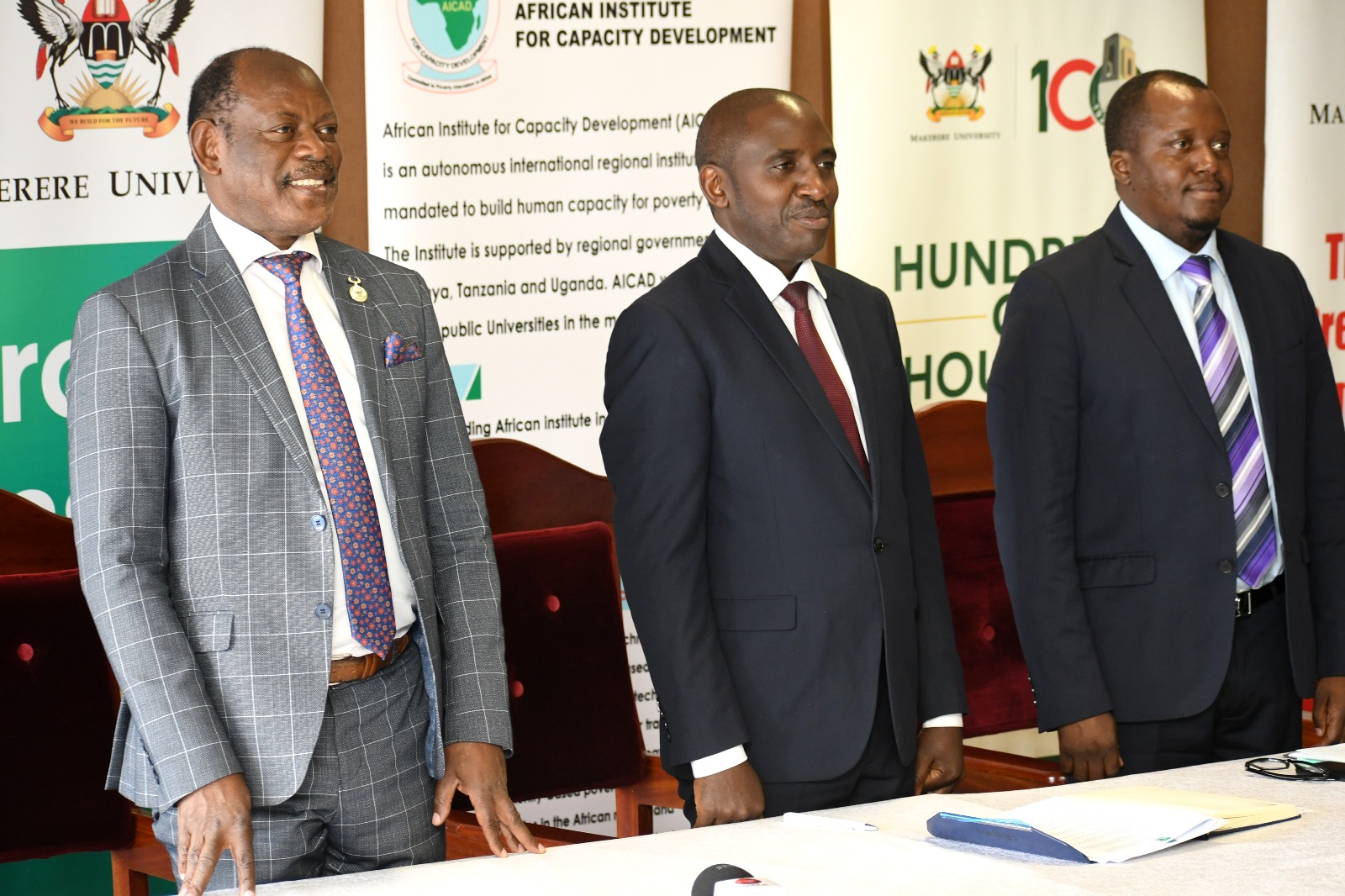
“The African Institute for Capacity Development (AICAD) has been selected to host the Africa Open Science Platform (AOSP) Node for the Eastern Africa region. This is a key milestone aimed at advancing scientific research and data sharing on the African continent,” said the Vice Chancellor, Prof. Barnabas Nawangwe during a press conference held on Wednesday 12th July 2023.
The Vice Chancellor who was joined by Dr. Gaston Ampe Tumuhimbise, the Country Director, AICAD Uganda Office informed journalists gathered in the Council Room, Frank Kalimuzo Central Teaching Facility, Makerere University that AICAD will host AOSP node for a period of five years effective June 2023.
The Press Release follows below:
PRESS RELEASE: AICAD SELECTED TO HOST AFRICA OPEN SCIENCE PLATFORM (AOSP) NODE FOR EASTERN AFRICA REGION
After a very rigorous and competitive process, the National Research Foundation (NRF) of South Africa has selected the African Institute for Capacity Development (AICAD) as a regional node for the African Open Science Platform (AOSP) taking charge of the East African region node. AICAD is a regional organization charged with linking university generated technologies to the communities to fight poverty with headquarters at Jomo Kenyata University of Agriculture and Technology. AICAD has country offices located at Makerere University in Uganda, Sokoine University of Agriculture in Tanzania and Egerton University in Kenya.
The other two award winners in Africa include; the Egyptian National Authority for Remote Sensing and Space Sciences (NARSS) for the Northern African Node based in Egypt and the UbuntuNet Alliance for the Southern Africa Node based in Malawi. The appointment will be for a five-year term, starting in June 2023, with additional regional nodes to be appointed to cover all regions of the continent.
Hosted by the National Research Foundation (NRF) since 2020, the AOSP aims to position African scientists at the cutting edge of data intensive science by stimulating interactivity and creating opportunity through the development of efficiencies of scale, building critical mass through shared capacities, and amplifying impact through a commonality of purpose and voice. This prominent initiative is supported by the South African Department of Science and Innovation, the International Science Council, CODATA, the Academy of Science of South Africa, and other prominent regional networks. The AOSP will also leverage international networks and developments, and the momentum towards operationalization of the international framework for open science.
The Vice Chancellor of Makerere University, Prof. Barnabas Nawangwe congratulates AICAD on being appointed to coordinate this noble initiative in East Africa. Makerere University welcomes every initiative and programme that harnesses the power of research to transform lives and societies. AICAD through this Africa Open Science Platform (AOSP) will enhance the ongoing efforts of ensuring that research, science and data contributes to reduction of poverty in the African region.
“The Makerere University Strategic Plan stipulates the re-positioning of Makerere University into a research led university. This is premised on the fact that no country can develop without research. The main goal of AICAD is fighting poverty using university generated innovations. I am happy to note that the National Research Foundation (NRF) of South Africa has appointed AICAD as a regional node for the African Open Science Platform (AOSP) taking charge of the East African region node. With this appointment, Makerere University is ready to work with AICAD to coordinate all member universities and other research data generating agencies to pursue the ideas of open science. The idea of open science and data sharing is key in the innovation process. When data is shared, solutions are quickly realized. I understand this is how the COVID-19 vaccine was quickly produced. Different research groups were able to share their data for a common cause,” remarked Prof. Nawangwe.
The role of the African Open Science Platform (AOSP) regional nodes will be to coordinate, create linkages, support, and promote efforts aligned with implementation of Open Science programmes at a regional level, strengthen knowledge networks and infrastructure access, and enhance cooperation between regions and globally in support of the AOSP’s vision. Among others, regional nodes will be expected to lead on programme delivery and implementation, coordination, capacity building, societal engagement in dialogue, and policy support and promotion of the UNESCO Open Science Recommendations at national and regional levels.
The incoming Director of the AOSP, Dr. Tshiamo Motsegwa, had this to say: “For the Global South, and the African continent specifically, the efficiency and productivity gains from Open Science present a compelling case for government research funding in the context of limited resources and competing priorities for the development of a facilitative and truly African-wide Open Science Diplomacy platform for enhancing continental coordination, collaboration and making global linkages – this to develop an African science system fit for purpose”.
About AICAD
AICAD Uganda Country office was established in 2000 located at Makerere University and headed by a Country Director. AICAD’s headquarters are located in Nairobi, Kenya. This office is responsible for coordinating the institute’s programs and activities dealing with poverty reduction in Uganda through human capacity development by linking knowledge to application. Initially, AICAD was funded through JICA but since 2012, the Institute’s programs are funded by the three governments of Uganda, Kenya and Tanzania. AICAD’s primary aim is poverty alleviation, by facilitating the local people to solve their problems. To do this, AICAD works with public Universities and other institutions to filter and apply those aspects of research that are of practical significance to targeted users. These include public universities such as Makerere, Kyambogo, Mbarara, Gulu, Busitema, Kabale, Muni and KIU. As part of its human capacity development, AICAD’s network has played useful roles in supporting young institutions, individual researchers (through graduate student’s research) and communities.
Follow this story on https://www.nrf.ac.za/the-african-open-science-platform-appoints-three-regional-nodes/
Summary of Matters Arising from the Question and Answer Session
Concept of Open Science
Public Higher Education Institutions such as Makerere and agencies such as the National Agricultural Research Organisation are publicly funded by taxpayers. As such they have a duty to account for the funding they receive to carry out research by sharing their findings. Open Science creates a space where the sharing of these findings can happen beyond forums where scientists and researchers only talk to each other. These findings are availed in simplified formats that can be accessed by innovators and entrepreneurs who may not have the capacity to undertake expensive research, to create goods and services for the benefit of the country.
The AOSP will enable data generated in Uganda as well as the Eastern Africa to be freely shared with the public for their use as well as journalists for further dissemination. The founding of AICAD in 1993 implicitly complied with the principles of open science. AICAD was founded in 1993 principally to reduce poverty through scientific research and sharing this knowledge with the community. Joint sharing of knowledge at international level in line with open science is one of the factors that led to the rapid development of the COVID-19 vaccine as well as curbing outbreaks of diseases such as ebola, nodding disease.
Makerere has actively participated in some of these initiatives and will strive to work on making others such the Parish Development Model (PDM) work for Uganda’s poverty alleviation agenda through the PDM lab. Additional undertakings in line with open science have seen Makerere develop and disseminate new crop varieties to farmers to improve productivity.
Implementation of the AOSP
AICAD’s selection to host the Eastern Africa node was boosted by its proficiency in supporting a network of universities and institutions to reach communities with knowledge and technologies that are geared towards poverty reduction. AOSP will enable AICAD to scale up and improve these efforts. Makerere is making efforts to commercialise its innovations and where necessary, forging partnerships with various entities to undertake manufacturing, as is the case with Alfasan Uganda Limited for production of the anti-tick vaccine. Other initiatives include the partnership with UNDP Uganda to set up the Makerere Innovations Hub.
Funding
The NRF will initially fund the AOSP node for Eastern Africa. In order to ensure its future sustainability, the platform will have the capacity to raise funds from other sources .
You may like
-


Call For Applications: MakNCD Masters and PhD Training Opportunities
-


Press Statement: Makerere University Congratulates Former Staff and Students on Successful Election to Public Office
-


Mak Hosts NCHE Competence-Based Education Standards Validation Meeting
-
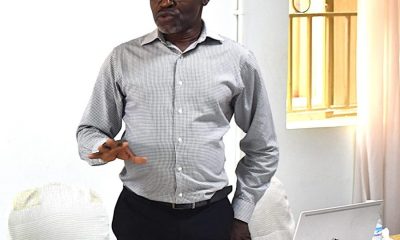

Enhancing Data Quality: NutriFishPlus Research Assistants Retooled Ahead of Baseline Survey
-
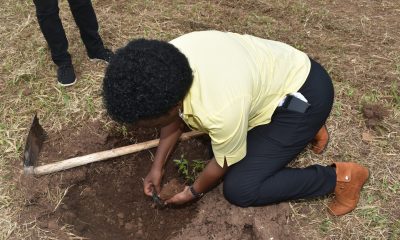

Call for Applications: QCF Postdoctoral Research Fellowships
-


Call For Applications: Annual Innovation Commercialisation Award
General
Press Statement: Makerere 76th Graduation Ceremony
Published
6 days agoon
January 28, 2026By
Mak Editor
Makerere University’s 76th graduation ceremony will be held from February 24th – 27th, 2026, at the Makerere University Freedom Square, starting at 8.30am. During the 76th graduation ceremony, we shall confer degrees and award certificates to 185 PhDs, 2034 Masters, 6,043 bachelors, 137 postgraduate diplomas and 33 diplomas.
I am proud to announce that in comparison to the 75th graduation, we have registered a 30% growth in graduate student output. This is a result of our strategic decision to prioritize graduate education per our research-led agenda.
I also wish to announce that the transcripts have been finalized and are ready for pick up. Today, I am handing over the ready transcripts to the College principals and can be picked up from respective Colleges even before the graduation ceremony.
Important to Note:
In preparation for the graduation ceremony, the University wishes to note the following:
- Pre-graduation clearances
Graduands are reminded to clear all necessary payments such as tuition and all graduation
fees. It is also important to check with your College to ensure your name is on the graduation
list and all mandatory clearances with university officials have been finalized. Note and
internalize the graduation schedule (attached) to know which day you are graduating. - Securing the graduation gowns
Graduation gowns will be issued starting from 2nd February 2026 from the University Hall (Dinning Hall), Monday to Friday, from 9am to 4pm. To collect your gown, check and ensure your name appears on the Senate Graduation list, present your student number or National ID, and proof of payment for the gown. - Security requirements
- Attendance: For each day of graduation, entrance to the graduation ground will be by invitation only. Graduands will be issued with invitation cards which permits two guests per graduand. Do not come with more than two people or they will not be allowed access to the graduation venue. Graduands are encouraged to arrive to settle at the Freedom Square by 7am on graduation day to for a seamless flow of planned activities including the necessary security checks.
- Prohibited items: Prohibited items include firearms, sharp instruments like mirrors and knives, alcohol, cell or batteries and chemicals, canned food and drinks, laptops, flashes and hard disks, radios including pocket radios, bottled drinks, cameras, large bags or any other heavy items.
- Media: All media and journalists who wish to cover the ceremony must be pre-accredited by the Makerere University Public Relations office or they will not be allowed to access the ceremony venue. The access point for accredited media personnel will be the Senate Building.
- Parking: There will be two designated parking areas; Rugby Grounds for those coming through the Eastern and Main Gate; and the second one is the Makerere University Main Grounds at Makerere College School. For VVIPs, VIPs and procession parking will be at CTF1, Directorate of Legal parking, St Francis and St Augustine parking, JICA and Senate Building.
- Access Control: To ease traffic flow and management, the University has planned three access points to the graduation venue: the School of Social Sciences, Senate Building and the University Swimming Pool.
- For help and inquiries
- Starting February 2, 2026, the Academic Registrar ’s Office and Graduation Committee will set up an information tent outside the Senate Building to provide guidance and handle all inquiries pertaining to graduation.
General
Re-Advert for the Position of the Second Deputy Vice Chancellor
Published
7 days agoon
January 27, 2026By
Mak Editor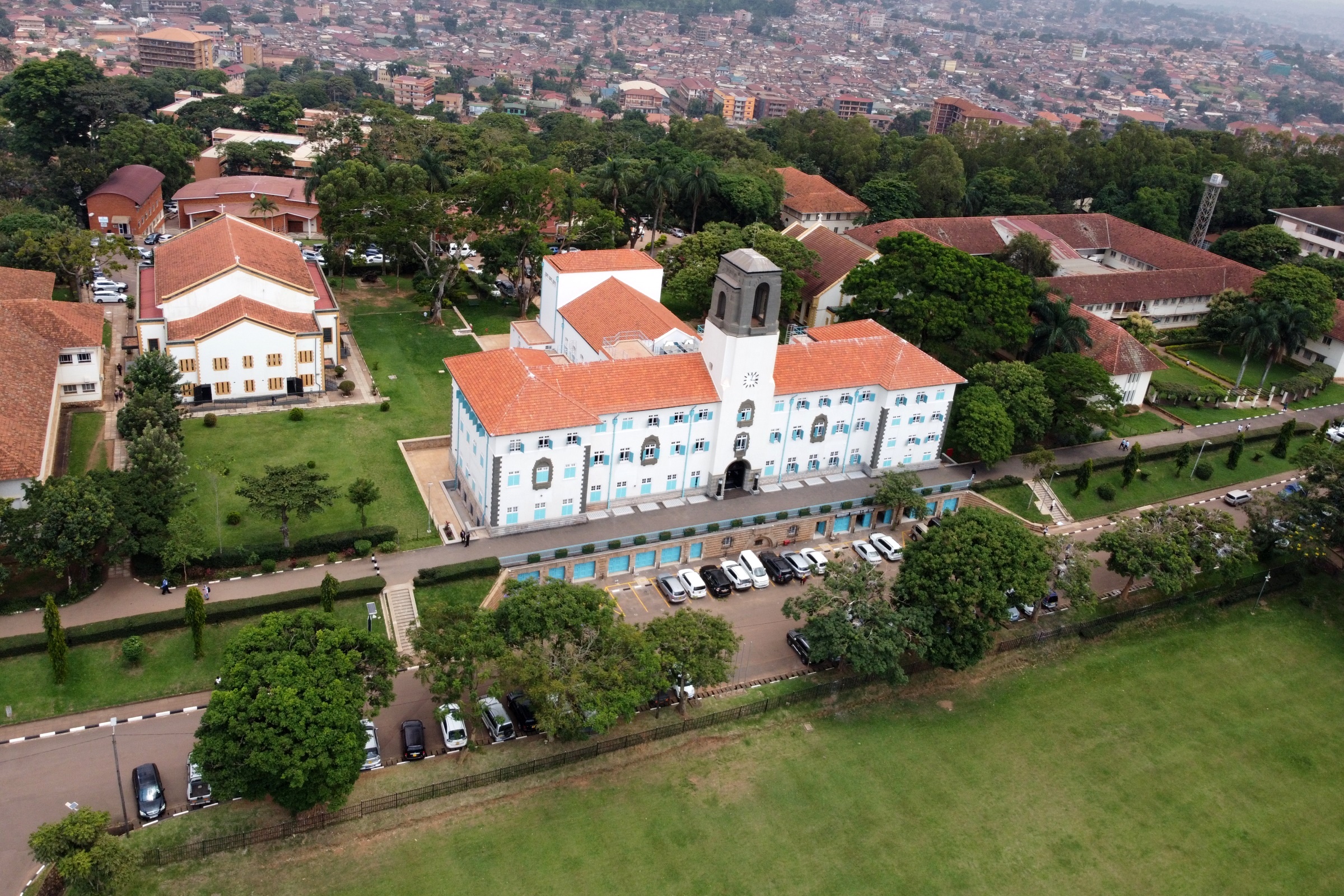
Makerere University is governed by the Universities and Other Tertiary Institutions Act, Cap 262. The University is seeking applications from suitably qualified applicants for the position of Second Deputy Vice-Chancellor. The Second Deputy Vice Chancellor holds a pivotal role in financial governance, institutional planning, and administrative leadership.
1. POSITION: SECOND DEPUTY VICE-CHANCELLOR
2. SALARY SCALE: PU2
3: DUTY STATION: MAKERERE UNIVERSITY
4. ROLE
The Second Deputy Vice-Chancellor will report to the Vice–Chancellor and shall:
- Assist the Vice Chancellor in performance of his or her functions and in that regard shall oversee the finances and administration of the University;
- Be responsible for the Planning and Development of the University and,
- Perform such other functions that may be delegated to him or her by the Vice Chancellor or assigned by the University Council.
5. PURPOSE OF THE JOB
To provide strategic leadership and ensure efficient and sound financial, human and fiscal resources management in the University.
6. DUTIES AND RESPONSIBILITIES
- Provide leadership in Strategic planning and governance, leadership and administrative experience, Human resource and performance Management, Stakeholder engagement and collaboration.
- Provide leadership in preparation and implementation of the University’s recurrent and capital budgets.
- Monitor the development and implementation of the University’s accounting procedures, manuals and other documents relating to financial control and Management as per approved financial regulations.
- Oversee income and expenditure of all income generating units of the University.
- Coordinate the production of the University-wide Financial Reports by Colleges and Units.
- Management of human resources in the University.
- Oversee the management of University Estates and Assets.
7. CANDIDATE SPECIFICATION
- Hold a PhD or any other academic doctorate.
- Be at the rank of associate or full professor level in an institution whose academic ranking is comparable with that of Makerere University as accepted by Senate.
- Be a Ugandan citizen within the age bracket of 40 to 65 years at the time of application.
7.1 Academic Qualifications
- Earned a Ph.D. or equivalent doctorate should be acceptable by Senate.
- At least five years of financial or administrative leadership experience at the level of school dean/director or higher in a higher education institution, public service, or corporate institutions.
- Supervised at least ten (10) postgraduate students (Master’s and Ph.D.) to completion. At least three of the students must be at the PhD level.
7.2 Strategic Planning and Governance
- Experience in leading large administrative teams at the level of dean or higher, demonstrating efficiency and productivity.
- Proven record in developing and executing strategic plans, aligning financial and administrative objectives with institutional goals.
- Evidence of developing and implementing financial policies that have improved financial efficiency, transparency, and risk management.
- Evidence of implementing organisational restructuring or process improvements to ensure operational efficiency.
- Ability to develop and implement institutional policies, ensuring compliance with national higher education and financial regulations.
7.3 Leadership & Administrative Experience
- Minimum 5 years of senior academic leadership in a recognized institution comparable with that of Makerere University, as accepted by Senate.
- Demonstrated experience in managing budgets exceeding UGX 500,000,000=, ensuring financial sustainability and accountability.
- Proven ability to mobilize resources, secure grants, and attract external funding to support institutional growth.
- Experience in conducting financial forecasting, cost control measures, and investment strategies to optimize institutional resources.
- Track record of leading financial audits and compliance assessments in alignment with national and international financial regulations.
- Experience in handling procurement, asset management, and infrastructure development, ensuring transparency and value for money.
7.4 Human Resource and Performance Management
- Track record of leading workforce planning, recruitment, and talent development strategies, ensuring a high-performance institutional culture.
- Experience in implementing performance-based appraisal systems, leading to improved staff efficiency and accountability.
- Proven ability to foster industrial harmony, resolving labour disputes and improving employer-employee relations.
7.5 Infrastructure Development and Resource Optimization
- Experience in overseeing capital development projects, ensuring timely delivery and cost efficiency.
- Track record of overseeing the maintenance and expansion of university facilities, enhancing institutional infrastructure.
- Proven ability to negotiate and manage contracts for outsourced services, ensuring cost-effectiveness and quality standards.
7.6 Digital Transformation and ICT Integration
- Experience in integrating ICT solutions in financial and administrative operations, improving service delivery and efficiency.
- Evidence steering the automation of financial, procurement, and HR systems, reducing paperwork and improving real-time decision making.
- Proven ability to implement cybersecurity measures that safeguard institutional financial and administrative data.
7.7 Stakeholder Engagement & Collaboration
- Demonstrated experience in building partnerships with government agencies, donors, private sector investors, and international organizations to enhance institutional funding.
- Proven ability to engage faculty, students, and staff in financial decision-making, ensuring transparency and inclusivity.
- Experience in negotiating contracts, partnerships, and collaborations that have led to financial and administrative growth.
7.8 Personal Attributes
- High level of integrity, transparency, and ethical leadership, with a record of financial prudence.
- Strong analytical, problem-solving, and decision-making skills, backed by evidence of successfully managing complex financial and administrative challenges.
- Excellent communication, negotiation, and interpersonal skills, ensuring effective stakeholder engagement.
- A visionary leader with the ability to drive financial sustainability. administrative efficiency, and institutional growth.
8. REMUNERATION
An attractive remuneration package that is in accordance with Makerere University terms and conditions of service.
9. TENURE
The Second Deputy Vice Chancellor shall hold office for a period of five years and shall be eligible for re-appointment for one more term.
10. METHOD OF APPLICATION
Interested applicants are invited to submit their application letters. The following documents shall comprise a complete application:
- A signed letter of application;
- A vision statement;
- Curriculum Vitae with contact details signed and dated by the applicant;
- Copies of required minimum number of publications;
- Certified copies of academic transcripts and certificates;
- Three (3) letters of recommendation;
- Copies of letters of appointment to leadership positions at the level of Dean of a School in a national accredited university or other academic institution;
- A copy of the applicant’s National Identity Card or passport;
- A copy of the last clearance from the Inspector General of Government or other equivalent national body;
- Referees should be advised to send confidential reference letters, addressed to the Chairperson Search Committee for the Position of Second Deputy Vice Chancellor and delivered directly to the address below by 5:00 pm on Friday 13th February, 2026;
- The references should cover the following areas: the applicant’s academic credential, experience, leadership, managerial and administrative skills and personal integrity.
Both Hardcopy and Electronic (Email) applications shall be accepted.
- Hardcopy applications: Both confidential letters and sealed applications marked “CONFIDENTIAL: POSITION OF SECOND DEPUTY VICE CHANCELLOR” should be addressed to:
SECRETARY SEARCH COMMITTEE
THE ACADEMIC REGISTRAR
MAKERERE UNIVERSITY
6TH Floor, ROOM 602, SENATE BUILDING
P.O.BOX 7062, KAMPALA, UGANDA
- Electronic media (e-mail) applications should have all the above documents scanned and emailed to search.dvcfa@mak.ac.ug by 5.00 pm East African Standard Time on Friday 13th February, 2026.
Please note that:
- Incomplete applications or applications received after the closing date and time will not be considered.
- Only shortlisted applicants shall be contacted.
- Applicants who responded to the advertisements published on 31st December 2025 (The New Vision) and 2nd January 2026 (The Daily Monitor) do not need to re-apply.
For more Information and inquiries:
Visit our website https://mak.ac.ug/search-for-dvcs OR email us on search.dvcfa@mak.ac.ug OR Call Telephone number: +256-414-532634 during working hours (between 8:00 am to 5:00 pm Monday to Friday).
MAKERERE UNIVERSITY IS AN EQUAL OPPORTUNITY EMPLOYER
Prof. Mukadasi Buyinza
ACADEMIC REGISTRAR
General
Press Statement: Makerere University Congratulates Former Staff and Students on Successful Election to Public Office
Published
7 days agoon
January 27, 2026By
Mak Editor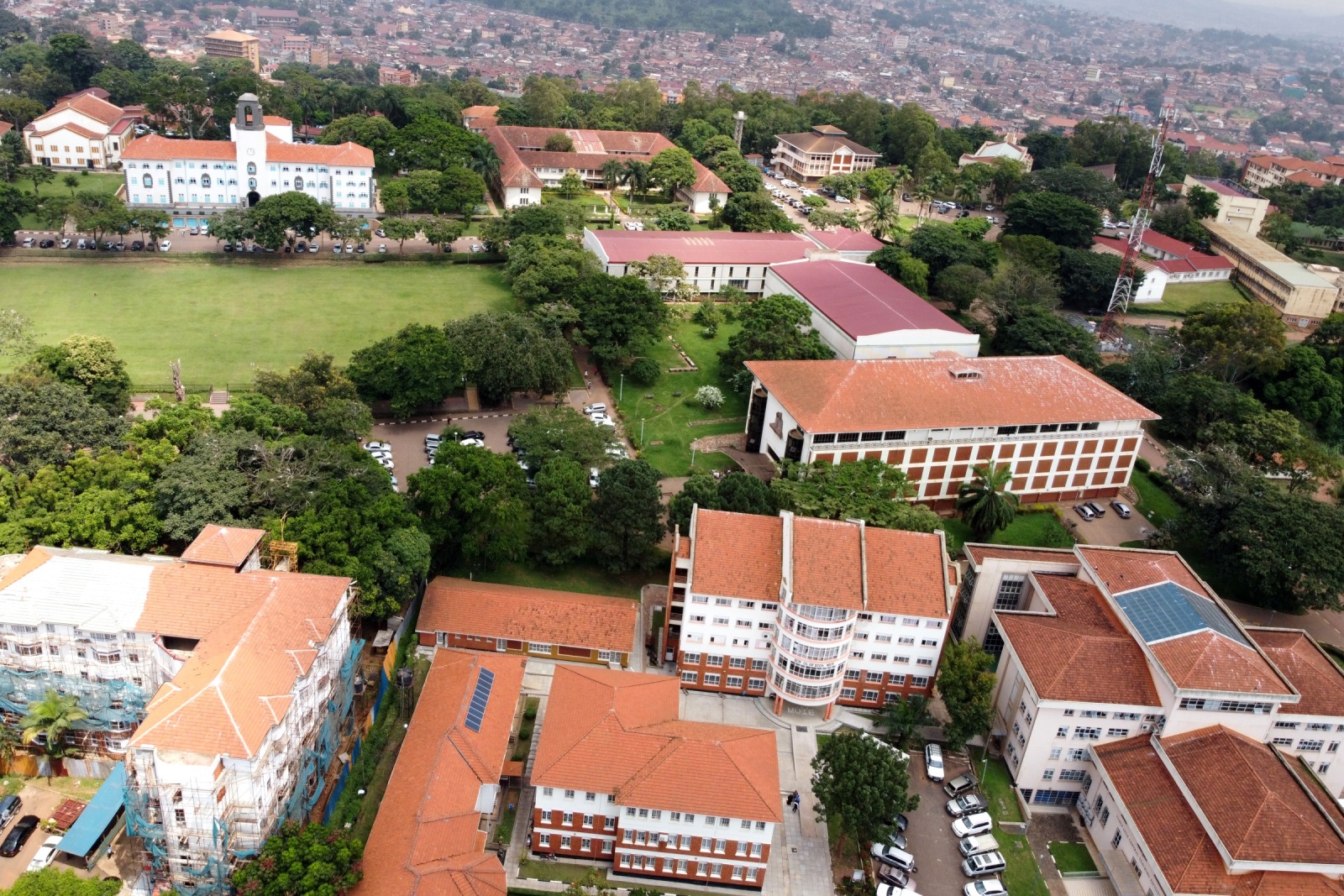
Makerere University warmly congratulates its former staff and students who emerged victorious in the 2026 national elections. Their success is a source of immense pride to the University and a strong affirmation of Makerere’s efforts to not only nurture academic excellence but also free expression and leadership. It is evidence of Makerere’s enduring impact and contribution to leadership, public service, and national development.
We are particularly pleased to recognize the following distinguished members of the Makerere University community who emerged victorious:
- Dr. Kiyonga Crispus Walter, Chancellor of Makerere University, on his election as MP for Bukonzo West.
- Rt. Hon. Tayebwa Thomas, former Chair, Finance, Planning, Administration, and Investment Committee of the University Council, on his re-election unopposed as MP for Ruhinda North and approval by the NRM Central Executive Committee (CEC) as Deputy Speaker 12th Parliament.
- Mr. Kabaasa Bruce Balaba, Chair, Finance, Planning, Administration, and Investment Committee of the University Council, on his election as MP for Rubanda County West.
- Hon. Nobert Mao, former Guild President, on his re-election as MP for Laroo-Pece.
- Mr. Alionzi Lawrence, former Guild President of Makerere University, on his election as Lord Mayor of Arua City.
- Mr. Maseruka Robert, former Guild President of Makerere University, on his election as MP for Mukono South.
- Mr. Gyaviira Lubowa Ssebina, former Deputy Bursar of Makerere University, on his election as MP for Nyendo–Mukungwe.
- Prof. Lubega George Willy, former Staff at College of Veterinary Medicine, Animal Resources and Biosecurity (COVAB), on his election as MP for Bugangaizi South.
- Prof. Ahebwa Wilber Manyisa, former Staff at College of Agricultural and Environmental Sciences (CAES), on his election as MP for Nakaseke North.
- Dr. Asiimwe Florence Akiiki, former Staff at College of Humanities and Social Sciences (CHUSS), on her election as Woman MP for Masindi District.
- Dr. Kasigwa Gerald, former Staff at College of Business and Management Sciences (CoBAMS), on his election as MP for Kigorobya County.
- Hon. Adeke Anna Ebaju, former Guild President, on her re-election as Woman MP for Soroti District.
- Hon. Onekalit Denis Amere, former Guild President, on his re-election as MP for Kitgum Municipality.
- Hon. Karuhanga Gerald, former Guild President, on his re-election as MP for Ntungamo Municipality.
- Hon. Aber Lillian, former Vice Guild President, on her re-election as Woman MP for Kitgum District.
- Hon. Nyamutoro Phiona, former Vice Guild President, on her election as Woman MPfor Nebbi District.
- Dr. Lakisa Mercy Faith, former Vice Guild President, on her election as Woman MP for Alebtong District.
- Ms. Lenia Charity Kevin, former Vice Guild President MUBS, on her election as MP for Vurra County.
- Dr. Nambassa Shamim, former Guild President, on her election as LC V Woman Councilor for Kawempe South.
- Dr. Nalukwago Judith, former Vice Guild President, on her election as LC V Woman Councilor for Makindye West.
- Ms. Nattabi Margaret, former Vice Guild President, on her election as Female Youth Councilor for Mukono Municipality.
- Mr. Kizito Abasi, former Guild Minister, on his election as LC V Chairman for Lwengo District.
- Ms. Ssonko H. Namuganga, former Guild Minister, on her election as Female Youth Councilor for Kalungu District.
Makerere values dialogue, democracy, and responsible citizenship, and continues to make deliberate and progressive efforts to enhance participation in leadership and governance. We are confident they will serve with dedication, wisdom, and integrity.
We Build for the Future.
Trending
-

 General2 weeks ago
General2 weeks agoPress Release: Semester II Set to Start 10th Feb, 76th Graduation Dates Confirmed
-

 General7 days ago
General7 days agoPress Statement: Makerere University Congratulates Former Staff and Students on Successful Election to Public Office
-

 Innovation2 weeks ago
Innovation2 weeks agoCall For Applications: Annual Innovation Commercialisation Award
-

 General6 days ago
General6 days agoPress Statement: Makerere 76th Graduation Ceremony
-

 Agriculture & Environment2 weeks ago
Agriculture & Environment2 weeks agoCall for Applications: QCF Postdoctoral Research Fellowships
